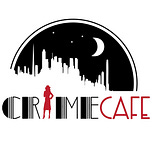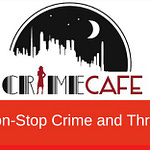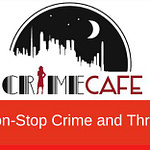
Here’s your early access to the latest episode!
Click here to download the transcript! :)

Debbi (00:00): Hi, everyone. My guest today writes crime fiction with a hint of romance and strong female characters. So, all right. I like that. She’s held a number of interesting jobs, which seems to be a trait among many writers that I know. She also has degrees in creative writing, forensic sciences, law, and security, to name a few. She has also pursued her lifelong dream of living in Edinburgh, Scotland, which is a really cool place. My guest today is crime writer, Wendy Hewlett. Hi Wendy. Thanks for being here today.
Wendy (01:32): Hi, Debbi. Thanks for having me.
Debbi (01:35): It’s a pleasure. Believe me. You have two series as well as the book you’re giving away Ailey of Skye. Is that how you pronounce it?
Wendy (01:47): Yeah. Yeah.
Debbi (01:49): It’s short for Aileen then. Is it?
Wendy (01:52): Yeah, it is.
Debbi (01:53): I like that. It’s my sister’s middle name, and I just started the first in the Taylor Sinclair series, Saving Grace. She’s a very interesting protagonist. Can you tell us more about the series and about Taylor Sinclair?
Wendy (02:08): Sure. All of my characters that I write are very strong women and they become that way from the hardships that they have been through in their lives. And, and Taylor has been through probably more than most and, and of course that involves PTSD and, and overcoming that. So she’s got a lot of issues and she spent most of her life living on the streets of Toronto and the first book in the series Saving Grace is her story of coming off the streets and the people that help her to do that who become very close friends, a close-knit group of three women.
Debbi (03:01): Yes. Yes. What inspired you to write your first novel?
Wendy (03:07): When I was in high school, my English teacher urged me to pursue a career in writing. So I went to school for journalism and I hated it. I quit at the end of the first year and the professor tried to talk me into staying. And I thought at the time it’s because the grade average was going to go down because I had the highest marks in the class. But I learned years later that my sister worked with his wife and apparently didn’t want me to leave because he thought I was very talented, which is a huge compliment. And I wish someone that time had said, you know, creative writing, try that. But I didn’t. I waited until in 2009, I was laid off from General Motors. I was a security and fire supervisor at General Motors for a lot of years.
Wendy (04:01): So when I was laid off I started doing a lot of reading and I thought, oh, I could write books like these. And that’s why I started writing in 2011. And I wanted somebody that was, you know, troubled difficult just to show the strength that she gets from that. And it ended up, when people started reading my book, I started getting messages from women saying, you know, they’ve been through a lot of trauma in their own childhoods and how much Taylor’s healing helped them to heal. And so that’s become, you know, a purpose almost with my books is helping women to heal and help to empower them.
I started getting messages from women saying, you know, they’ve been through a lot of trauma in their own childhoods and how much Taylor’s healing helped them to heal. And so that’s become, you know, a purpose almost with my books is helping women to heal and help to empower them.
Debbi (04:45): I noticed that in your bio. I thought that was rather remarkable. And do you have a particular type of demographic in mind when you write, I hate to say, read your avatar, but do you think about that as you’re writing these books?
Wendy (05:01): A little bit. Yeah. I think most people do, I’m basically writing to all women because I know most of them have been through difficulties and struggle, and the way we gain that strength is by overcoming it. And there’s a lot of ways we can do that.
I’m basically writing to all women because I know most of them have been through difficulties and struggle, and the way we gain that strength is by overcoming it. And there’s a lot of ways we can do that.
Debbi (05:22): You’re absolutely right about that. Can you give me an idea of Taylor’s arc, story arc through the series? I assume that there is, there are stages of improvement as she goes through the series?
Wendy (05:40): Her friendship with Gray Rowan, who is an author. The series starts up with a murderer escaping from prison. And he’s the man who murdered Taylor’s sister 16 years before. And it was Gray Rowan who he had kidnapped and held for several days who escaped and was responsible for him being captured. So when he escapes, Taylor knows he’s going to go after Gray Rowan. He wants to, so she tries to talk to Toronto police and they’re not listening to her. So she decides she’s going to go and do something about it herself. And Gray ends up taking her in and they develop a really close bond over their shared past trauma and, and what Gray went through and what she knew about Taylor’s sister.
Wendy (06:47): And it develops from there. A Toronto police detective sergeant gets involved in the case. And then when they capture this guy there’s a little twist. Everybody thinks the end is going to be when this guy is captured. Right? But it’s only really just the beginning of the story because Taylor being on the news, her past becomes front and center in the media and she becomes really harassed by the media a lot. And so she has to deal with that. And there is an investigation into her abuser. It comes about from the media attention, right? And so her, she develops a really close bond with Detective Sergeant Christina as well, who’s the detective sergeant investigating the case. And Chris convinces Taylor to go to police college and come to work with her with in the Toronto sex crimes unit with the Toronto police. And so the second book, Unfinished Business, she’s still dealing with stuff from her past, but starting with the third book, Runed, every book, it’s going to be a different case with the Toronto sex crimes unit with Taylor and Chris working the cases.
A Toronto police detective sergeant gets involved in the case. And then when they capture this guy there’s a little twist. Everybody thinks the end is going to be when this guy is captured. Right? But it’s only really just the beginning of the story because Taylor being on the news, her past becomes front and center in the media and she becomes really harassed by the media a lot. And so she has to deal with that.
Debbi (08:15): Hmm. Fascinating. I love the relationship between Gray and Taylor, by the way. I just, that kind of mentoring relationship, that protective relationship is really great. And they became two women who are supporting each other and helping each other. Yeah. I love that.
Wendy (08:37): And Chris has done a lot of that as well, but she’s got a, more of a kind of dark sense of humor and a bit of a potty mouth.
Debbi (08:44): Who’s this again?
Wendy (08:46): Chris, Detective Sergeant Chris Cain.
Debbi (08:48): Oh yeah. The potty mouth. Yeah. Yeah. She’s the cop, she gets to have the potty mouth. I was going to say your credentials are just really amazing. Forensic science, and you’ve also worked as a counselor for alcoholics and drug addicts. So how much of your stories and the characters do you draw through your actual experiences?
Wendy (09:15): The characters themselves? Not so much, but what I’ve learned from working with people in the security field, in the addictions treatment field way back when I worked on cruise ships, what I’ve learned with working with people back then, all of that plays into it. So the characters are not so much from my real life, I don’t really make them after someone that I know. But definitely the knowledge that I’ve gained through my experience, my life experience helps to build those characters.
[W]hat I’ve learned from working with people in the security field, in the addictions treatment field way back when I worked on cruise ships, what I’ve learned with working with people back then, all of that plays into it. So the characters are not so much from my real life, I don’t really make them after someone that I know. But definitely the knowledge that I’ve gained through my experience, my life experience helps to build those characters.
Debbi (09:59): It certainly must help you understand their motivations and how they would act in certain situations,
Wendy (10:06): Definitely. Ailey of Skye. She’s a recovering addict, alcoholic. And she travels from Toronto to the Isle of Skye, because her grandmother, she has left her a house there. So she wants to, and she’s just come out of rehab. And she’s trying to decide what to do with her life and what to do with this cottage that’s been left to her. So she flies over there and she gets a big surprise when she arrives because she has family there, her brother’s living in the house. She gets there and there’s a man in the house and her mother is also still alive, which she didn’t know. She thought she’d died shortly after her birth. So it’s an interesting story about, you know, overcoming addictions and, and finding that family love, you know?
Debbi (10:58): Very cool. Yeah, that sounds wonderful. Tell us a little about your Solstice Coven series. I thought that the protagonist sounded particularly fascinating, a constable descended from Wiccans, is that right?
Wendy (11:16): Yeah. I’ve always wanted to, I’ve always been interested in Wicca, and a whole religion around it and witches, and that sort of thing. So the protagonist in that is the detective, Constable Raven Bowen and her mother has just passed away. She works up in a remote area in central Ontario. It’s all lakes and trees cottages, that sort of thing. And when her mother passes away, she hasn’t talked to her in over 12 years. They had a big falling out when Raven was 15 and they never spoke again.
So shortly after her mother passed away, she’s just started a new investigation when a murder or a murder victim is found and her mother starts talking to her from beyond the grave. So she’s hearing her mother’s voice in her head. So if she says, Bonnie says like, “What the heck do I have to do to get you out of my head?” And her mother says, “Find my killer.” So it goes from there. Kind of interesting. She’s also her character is gay, which I wanted to do because it’s very accepted in the Wiccan religion. So I wanted to show that, you know, where a lot of places in the world it’s still taboo. Still a very difficult thing, even in like Canada, in the U S sometimes, it’s, it’s very difficult, but in the Wiccan religion, it’s very accepted. And I thought that was a beautiful thing. So I wanted to make it up.
Debbi (12:59): I had no no idea and I think that’s fascinating. Interesting. why in particular, were you interested in Wicca? Just out of curiosity,
Wendy (13:10): It’s just something I’ve always been interested in. My mother was psychic, so she used to do a lot of psychic readings and that sort of thing. She wasn’t Wicca, but she would meet with groups of women and some of them were Wiccan, and, and I just really developed an interest in it, and I find it all very fascinating.
Debbi (13:29): Hmm. Interesting. Now you recently moved from Canada to Scotland. How’s that going?
Wendy (13:38): So far, so good. Well, it’s something I’ve dreamed of doing for a long time. I was born here in Edinburgh. And the opportunity came at the beginning of this year, just before the coronavirus outbreak happened. And, you know, I thought about putting it off till next year, or, you know, waiting to see what happens. And then I decided, you know, I’m going to go for it. The long [inaudible] in the UK and in Canada in July there, I thought that, you know, I can get over there now safely. And if there’s another second wave or another lockdown, I’ll be over there, I’ll be fine. So I went for it. I got on a plane at 10 o’clock at night on August the second. So was almost exactly two months ago. And then I arrived here on August the third. So we did a two week lockdown or self isolation which was hard because I was just itching to get out and explore and it looked nice and sunny out there. So once I got out, I’ve just been walking Edinburgh been doing just basically walking tours all over the city. Portobello Beach. Today, I hiked up to the summit on Arthur’s Seat. I don’t know if you’ve ever done that, but that was, it was so beautiful.
Well, [moving to Scotland is] something I’ve dreamed of doing for a long time. I was born here in Edinburgh. And the opportunity came at the beginning of this year, just before the coronavirus outbreak happened. And, you know, I thought about putting it off till next year, or, you know, waiting to see what happens. And then I decided, you know, I’m going to go for it.
Debbi (15:15): I didn’t. I did do a lot of walking in Edinburgh and we walked up the Scott Monument.
Wendy (15:20): Yeah, that’s closed. I haven’t done that yet, but it’s on my list, but not opened yet from the lockdown. One day, I’ll do that.
Debbi (15:30): Yeah. You gotta do that. Yeah. I did it and I was just like, all right. I made it.
Wendy (15:37): That’s how I felt today. Beautiful views, though. You know?
Debbi (15:46): Yeah. You have beautiful views and it really is a charming city. I mean, it is quaint and, and historic and I loved it there.
Wendy (15:56): Small enough that you can walk everywhere, you know, small enough that you can walk everywhere. It’s fantastic.
Debbi (16:02): Very walkable. Yeah. Very walkable
Wendy (16:06): The old part of town that was, it’s medieval, you know, it goes back some buildings almost a thousand years and the new town, which is Victorian or Georgian, but the new town and it’s still very, very old. It’s still beautiful.
Debbi (16:27): Yeah. since you’re delving a lot into Scottish history, I believe, myths and things have you ever considered writing nonfiction about Scotland, a travel guide or anything like that? A history?
Wendy (16:43): I hadn’t really, but you know what I’ve been doing? I’ve been, cause I’m taking a lot of pictures and videos. So I’ve been putting videos up on YouTube. Just kind of chronicling my travels and for anybody who wants to kind of come along with me, like my, my oldest sister can’t travel and she’s, you know, wanted to come home. She would call it coming home. And she can’t. So it’s kind of my way of bringing her along with me, you know?
Debbi (17:13): That’s great. That’s really great. And the rest of us, too. I mean, that’s fantastic.
Wendy (17:20): Yeah.
Debbi (17:22): Who are your favorite authors and which ones have inspired you the most?
Wendy (17:27): Ooh, that’s a toughie. And a lot of the authors I read these days are indie authors. I’m so not well known to everybody else really. But what inspired me to start writing? I was reading a lot cause I wasn’t working. And I was reading JD Robb’s In Death series. That’s when I started thinking, you know, I could write books like these, I’ve got, I know criminal law in Canada and I know the judicial system. I’ve got experience in that kind of thing. I can, I can write this. And so I just started writing and it was like the characters wrote the story, you know, characters took me on their journey. So it was really cool. But yeah. So JD Robb, who is Nora Roberts, a pen name for Nora Roberts. And I don’t know. I’ve got I read a lot of authors.
But what inspired me to start writing? I was reading a lot cause I wasn’t working. And I was reading JD Robb’s In Death series. That’s when I started thinking, you know, I could write books like these, I’ve got, I know criminal law in Canada and I know the judicial system. I’ve got experience in that kind of thing.
Wendy (18:32): One from here in Edinburgh, Ian Rankin who wrote the Rebus novels. There’s a TV show up. I don’t know if you’ve been able to get that over there. He’s really good and very popular. I dunno, I read so many authors. I don’t know if I really have a favorite. Growing up, it was Beverly Clearly. Did you read the Beverly Clearly novels as a kid?
Debbi (18:58): I have not.
Wendy (18:58): Beverly Clearly. She’s gone now, but there’s a whole, whole bunch of, Beezus and Ramona are the main characters. I think that’s the name of one of the books. Beezus is B-E-E-Z-U-S. American.
Debbi (19:20):Beezus and Ramona.
Wendy (19:21): Yeah.
Debbi (19:23): Okay.
Wendy (19:26): But you know, those are the first novels that I started reading. I love them.
Debbi (19:31): Kids books can be really fun.
Wendy (19:34): Oh, yeah. I still have my A-books. They’re awesome. You know, there’s so many great novels out there written for youth, but adults love them, too. And they’re great stories.
Debbi (19:52): Absolutely. They tend to explore timeless themes, I think.
Wendy (19:58): Yeah.
Debbi (19:59): Things that affect us throughout our lives. How would you describe your own writing in general? Would you call it mystery, thriller, suspense?
Wendy (20:12): It’s probably more suspense than anything else. Crime fiction, suspense. I usually write female detectives, although Ailey of Skye is not a female detective novel. Her brother is a cop, but she’s never worked. She’s just trying to get her life together and see what she wants to do. Right? But most of my books are female detectives. So police procedurals they could even be called.
Debbi (20:43): The protagonists are always female.
Wendy (20:48): Yeah.
Debbi (20:49): Even if they aren’t strictly speaking detectives.
Wendy (20:54): Yeah.
Debbi (20:57): Well, cool. Is there anything else you’d like to tell us before we finish up, about your work or about Scotland or anything?
Wendy (21:08): About Scotland. I guess what I want to say about, about coming to Scotland and following a dream I’ve had for a long time is you’re never too old to live your dreams. Never give up on your dreams and you’re not too old to go pursue new ones or make new goals. You know, it’s never too late. Go for it.
Never give up on your dreams and you’re not too old to go pursue new ones or make new goals. You know, it’s never too late. Go for it.
Debbi (21:34): That’s wonderful. That is the best advice ever. Thank you so much for that. And thank you for being here today. I really appreciate it.
Wendy (21:45): I really appreciate it, too. I’ve really enjoyed this. Thanks so much for having me.
Debbi (21:49): Me too. It was great talking to you. Thank you for being here today, Wendy, and to everyone listening. I just want to say, Oh, I also wanted to add, if I ever get to Edinburgh again, I’ll look you up. We can walk on the streets together. Hopefully, maybe even climb the Scott Monument together.
Wendy (22:12): I’ll take you to all the good places.
Debbi (22:12): Oh, good, good. Yeah, that’ll be great. Yeah, cause Scotland was really nice. The UK, the whole place just wonderful. Thank you to everyone listening or watching this. Don’t forget Wendy is giving away her book, Ailey of Skye and look for her guest post on my blog at debbimack.com and leave a comment there, if you want to enter. In addition, I would like to thank our supporters at Patreon. We are Patreon-supported and please feel free to check us out there. You’ll find the link on my website, debbimack.com. And if you’ve enjoyed this episode, please leave a review. Please be nice. And our guest in two weeks will be AC Frieden. In the meantime, take care and happy reading.
*****
Get early access to the podcast and more by becoming a patron! 🙂














Share this post